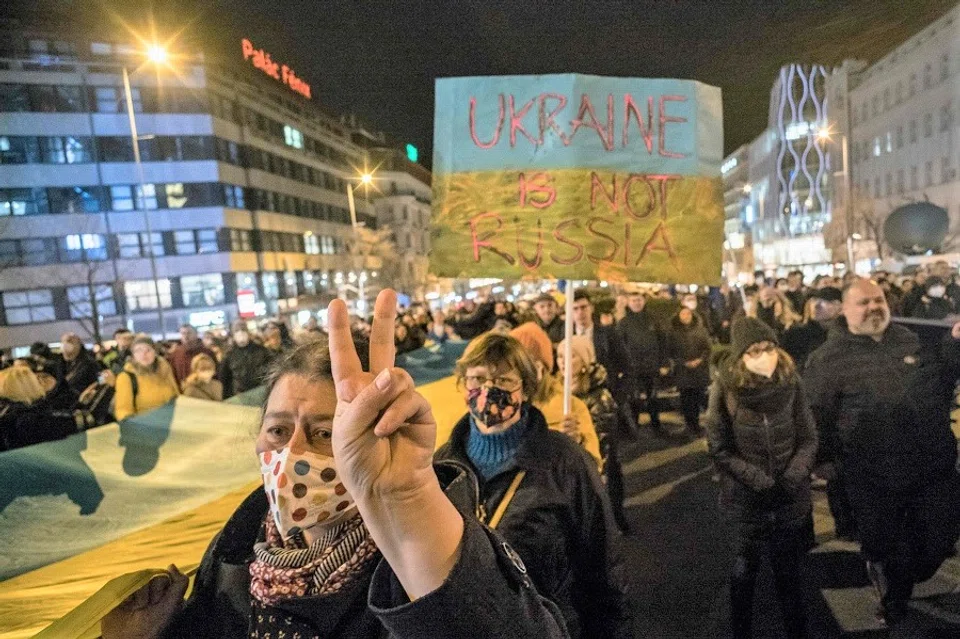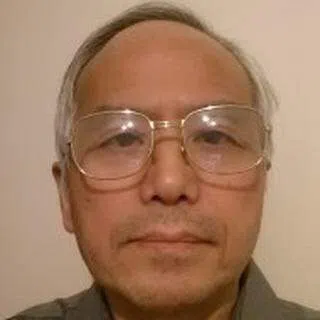Can China benefit as a bystander in the Russia-Ukraine crisis?
President Vladimir Putin of Russia declared the start of a "special military operation" in Ukraine on 24 February, saying that he would seek to demilitarise the country. According to reports, Russian troops have attacked Ukraine from Belarus as well as Russia with Belarusian support, and an attack was also being launched from annexed Crimea. Amid the unfolding situation, US-based academic Zhou Nongjian thinks that China needs to maintain a balanced approach towards Russia's military action - while China may benefit as a bystander, a close neighbour that is expanding unreservedly could mean trouble in the future.

Whether from the perspective of the Five Principles of Peaceful Coexistence or the modern history of China-Russia relations, China should take a balanced approach towards Russia's military action against Ukraine.
On 21 February, Russian President Vladimir Putin signed two decrees recognising two separatist regions of eastern Ukraine - the Lugansk People's Republic and the Donetsk People's Republic - as independent and sovereign states, and ordered Russian troops into eastern Ukraine. Predictions that Russia would invade Ukraine after the Beijing Winter Olympics have come true.
In response to Putin's decrees, the United Nations (UN) reiterated that Ukraine's sovereignty, independence and territorial integrity within its borders should be respected. Meanwhile, French President Emmanuel Macron and German Chancellor Olaf Scholz, who had both tried to de-escalate the Ukraine crisis, expressed their disappointment.

The US quickly imposed sanctions on the two breakaway regions, while the European Union (EU) and NATO condemned Russia for violating the Minsk Agreements. EU leaders also announced that they would be imposing sanctions on Russia. The permanent representative of China to the UN called for a peaceful settlement of disputes and for all parties concerned to exercise restraint.
Chinese observers have gotten it wrong
Prior to this development, some Chinese observers of international or Russian affairs believed that Russia would not invade Ukraine. Now, this theory has been proven wrong and their statements in defence of Russia have been debunked as well.
First, they believed that the US wanted Russia to invade Ukraine so that US arms dealers would profit from it, and the dollar would flow back to the US. This theory is as far-fetched as saying that the US hopes that mainland China will invade Taiwan to continue the US's arms sales to Taiwan and the dollar can flow back to the US.
Second, they assessed that Russia was forced to take an aggressive stance because Ukraine wanted to gain membership into NATO. As a sovereign state, why does Ukraine need Russia's approval to form an alliance with a third party? And even if Ukraine does join NATO in the future, would this be a reason for invasion?
If China were in Russia's shoes, would it mean that China should deploy troops to invade Myanmar, Afghanistan or South Korea each time these countries wanted to form an alliance with the US or other countries? China would not do so, and has never done so. At most China would convey regret or disapproval through a government spokesperson.
...these Chinese observers seem to have conflated the Russia-Ukraine issue and the cross-strait issue such that justifying Russia's use of force against Ukraine in turn justifies "reunification by force" (武统) in the Taiwan Strait. In fact, the two issues are separate.

China's principles for foreign policy are expressed in the Five Principles of Peaceful Coexistence, of which the first three are mutual respect for sovereignty and territorial integrity; mutual non-aggression; and mutual non-interference in each other's internal affairs.
While China has had border conflicts with its neighbours and its military has been deployed cross-border for short periods in the past, those are neither caused by a country's alliance with a third party nor done with the purpose of encroaching on a neighbours' territory as per the case of Russia's annexation of Crimea.
Third, these Chinese observers seem to have conflated the Russia-Ukraine issue and the cross-strait issue such that justifying Russia's use of force against Ukraine in turn justifies "reunification by force" (武统) in the Taiwan Strait. In fact, the two issues are separate.

Russia and Ukraine are completely separate entities with their own sovereignty and territory. However, while the two sides of the Taiwan Strait are separated after the civil war, their respective constitutions and territorial maps still refer to the same land and the same country, even though each side has different terms for it.
Clearly, cross-strait reunification - regardless of how it happens - does not need justification through a precedent of a country invading another country, or by violating China's long-held principles such as the Five Principles of Peaceful Coexistence and the modern standards of international relations.
Russia's 'nibble warfare'
As of 23 February, Russia has sent troops into eastern Ukraine, with the same "nibble warfare" strategy that it used on Crimea: encouraging a place to become independent, recognising its independence, then having that place "willingly" join Russia.
Previously, Russia used Ukraine's desire to join NATO as an excuse to mobilise its troops. Now, even that reason has been dropped. Putin says that from a historical perspective, Ukraine's acceptance into NATO no longer makes a difference to Russia.
In other words, even if Ukraine does not join NATO now, Russia will still take action. Putin puts forth a number of reasons for this: eastern Ukraine is a "historically Russian land"; Ukraine never had stable traditions of real statehood; and modern Ukraine was created by the Bolsheviks after the 1917 revolution.

Furthermore, he claims that post-Soviet Ukraine took everything it could from Russia without giving anything in return.
This also became a reason to invade Ukraine, showing that the worldview of Putin and Russians is stuck in the days of the Russian Empire and has not evolved over the last century.
A close neighbour that is expanding unreservedly, and whose worldview is stuck in the days of an old empire, will not be beneficial for China in the future.
China can benefit as a bystander?
Looking at these tactics - reminiscent of the Chinese historical novel Romance of the Three Kingdoms - the Russian invasion of Ukraine and the conflict between Russia and the NATO member states would bring two benefits to China as a bystander.
First, the Russia-Ukraine crisis has distracted the US and Western countries from pressuring and intimidating China. This has given China more time to grow and reap the benefits while keeping its head down.

Second, Russia cannot drop its economic and trade ties with China due to the harsh economic sanctions by the US and the EU. This is a momentary gain for the Chinese economy.
However, China should have a balanced approach towards Russia's military action against Ukraine. It has to think about the immediate benefits and the modern standards of international relations and international ethics, while not allowing itself to forget the lessons from history just for momentary gain.
China should have its guard up against Russia. A close neighbour that is expanding unreservedly, and whose worldview is stuck in the days of an old empire, will not be beneficial for China in the future.
Related: Russia-Ukraine crisis: Can Russian aggression bring back the former glory of the Soviet Union? | Who dictates war and peace in the Taiwan Strait? | Does Beijing benefit from US-Russia confrontation over Ukraine? | US, Russia and China using Kazakhstan unrest as a proxy | Can Biden 'set up' the US and Russia against China? | China's alliance with Russia is solidifying



![[Photos] Fact versus fiction: The portrayal of WWII anti-Japanese martyrs in Taiwan](https://cassette.sphdigital.com.sg/image/thinkchina/3494f8bd481870f7c65b881fd21a3fd733f573f23232376e39c532a2c7593cbc)

